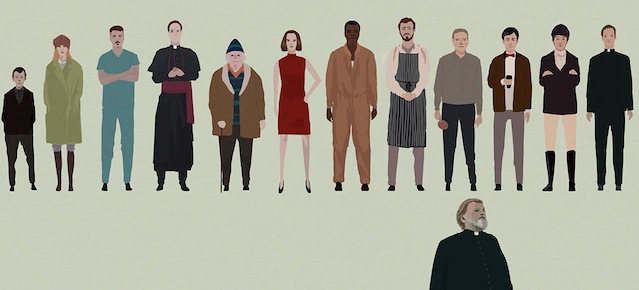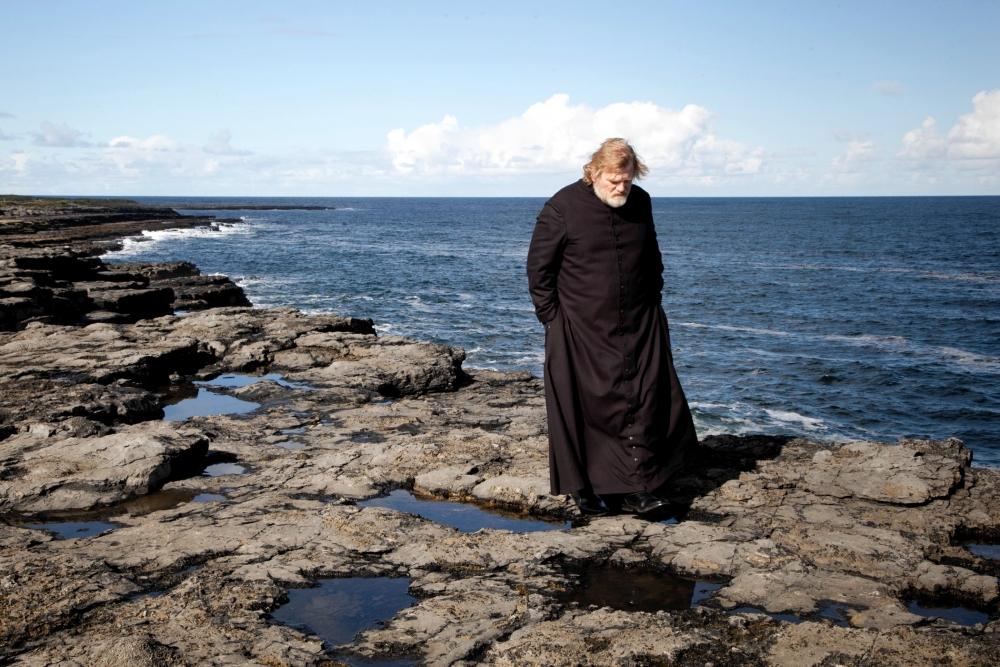
In an interview about this most recent project with writer/director John Michael McDonagh (for whom he also starred in The Guard), Brendan Gleeson explains that there was one peculiar element of putting on the cassock of a priest. He says that McDonagh directed him to view the garb as a kind of armor, a self-contained defense of faith in a faithless world. But what he found surprising, given the story of Calvary, and the fact that his corpulent character filled that cassock, was that the “armor” of God spilled over. Instead of self-containment, the priest’s black cassock was “an opening heart” to a cast of characters “perpetually building walls around themselves.” Dark irony for the age of skepticism, when words like “narrow” or “encased” or “barren” are more often the (well-deserved) descriptors of emptying churches than the communities they repel; and when words like “open” and “generous” and “kind” are anything but the adjectives people connect to black robes and kneelers and gilded pulpits.
We assume this would be a well-earned victory for the life-battered Father James (Gleeson), a second-career priest, a widower with a daughter, and an alcoholic. And a victory for the one, holy catholic church, to have earned some respectable stake back for the years of bad airtime. But we’d be wrong. Sure, nearly the whole village comes to church each Sunday, and the priest knows the dirty laundry of each, but no one wants him around. As quick as the townspeople are to grant Father James is a good priest, they do not want him—or his expiation—meddling into the town’s well-guarded cynicism. In other words, he may be a good priest, but there can be no good priests. And this is made clear from the stirring first scene—a vow from the confessional, a faceless confessor, that vengeance—and not absolution—will out: “I am going to kill you, Father, because you’re innocent.”
[youtube=https://www.youtube.com/watch?v=VtLcH5-Uoow&w=600]
Proving this man wrong seems to be the film’s implicit reading of Christ’s ministry. A man confesses that a priest earlier in life had abused him repeatedly, that nothing can be done to amend what’s been done—not therapy, not criminal justice—only the sacrifice of the innocent: Father James. “That’d be a shock.” The film encloses the audience, from the opening scene to the final scene, within the week of the promised end. In the tradition of Agatha Christie whodunits, we are given the end, but we are left questioning, in the cold expanse of rural Ireland, who will it be?
And the answer, according to John Michael McDonagh, seems to be anyone. The rich man, the mechanic, the bartender, the doctor, the butcher, the addled fogey, the addled moto-hipster. Who will it be? There are reasons for them all. In a way, they are all of a piece—a legion of barricaded and isolated parishioners—all wary of the “gobbledygook” of organized religion, all still coming to church for whatever reason, be it normative pressures or some kind of subconscious relief.
An odd detail, though: the audience soon realizes that the who-will-do-it nature of the film is not the nature for Father James, who knows the face of the confessor and will not divulge his identity. We follow him on a week’s worth of pastoral errands, his parish none the wiser of the threat, and we watch for a telling facial expression, a subtle phrase, that might lead us to believe this is him, the killer-to-be. And so there isn’t a decoy so much as a town of decoys, and the priest’s unflagging treatment gives nothing away but that the priest is more present than anyone realizes. With each darkened doorway, his company is a profound weight in the room (both emotionally- and visually-speaking) that no one wants to be bothered with.
But this is also only partially true. Moments of true intimacy are not far between the desolating ones. Father James listens in prison through the fitful rounds of a young man’s serial murders, and he prays alongside the wife of a man killed in a car accident. And even the desolating scenes lead the townspeople into a new kind of awareness into that desolation: Michael Fitzgerald (Dylan Moran), the town’s lonely (and funny) rich man and church absentee, invites Father James over for penance, and a drink (James is a recovering alcoholic, we find: “I liked it too much.”). Fitzgerald drunkenly regales him of his wealth and misery, pissing on an original Dalí to prove it. Father James remarks that Fitzgerald has not called for penance, but for a show, and that he can call when he really wants to confess.
[youtube=https://www.youtube.com/watch?v=XxCeiEUKfMs&w=600]
I was reminded in Calvary of another slice-of-town-life “priest”, Wilder’s Theophilus North, of his ever-presence in all the seven cities of Newport, Rhode Island, and his ingenuity and his fittedness in each peculiar drama the town called him into. But Father James’ help is never quite a fit with his people—he doesn’t have the universal wit or the charm that makes Theophilus the successful minister he is. To me, this is more realistic. Father James is human, to be sure, but Father James’ good news is far too acerbic, far too much an offense to self-preservation, for anyone with a right mind to go running to hear it. For Calvary’s image of ministry, grace will always stand on the other side of the threshold of truth, waiting for that last desperate moment to be called in. It’s not that it isn’t there all along, but that it’s never an attractive option to see things as they really are.
For the cynic who is protected by his disapproval, this truth-telling aspect is what Simone Weil calls the “void” of grace—the abyss it reveals, and the abyss only it can fill. Grace speaks the offense, which also clears the way for its word of pardon. It is equally acquainted with both—the dead and the new.
This acquaintance with both the world of death and resurrection is what makes Father James an unsurprised (if world-weary) minister, which contrasts awkwardly with his underling, Father Leary, a young seminary guppy, who we hear first saying, “The things people say in confession these days!” in complete astonishment at the sin of the world. We are meant to think on this strange bipolarity: which minister, what ministry does the world see? What world does the ministry see? While Father Leary has energy, it is green, naive energy, not any more ready to look into the face of the real world than his parishioners.
And while Father James seems haggard, and less than holy, McDonagh seems to want this complication, to draw a line between faith and dishonesty, instead of making that line between the faithful and the secular. McDonagh’s “good priest” is given Abraham’s righteousness—not the moral tidiness of a Sadducee, but the veracity of a believer. When Father James tells Father Leary that he “lacks integrity”, he also says “that is the worst thing I can say about a man.” We get the feeling that McDonagh is bemoaning that this guy is what the church has become—more or less a pretty nice guy, and nothing more.
And all the while there is our hero, our second-career priest, and his prodigal daughter Fiona (played by Kelly Reilly), who’s just come home after a botched suicide. Through her we see the real minister: a father who welcomes her home, tends to her wounds, tells her stories, and gives her a place to rest for a while. She spends one last day with him—the day before he is to meet his murderer on the beach—and then returns to London. She explains her frustration at his joining the priesthood, that he chose the church over her. He places his hand on her heart to remind her that he will never be absent.
And then the promised end arrives. And I won’t spoil it for you, but there is a powerful response to the world of vengeance winning out, and it begins with a telephone call. From the skylined backdrop of a fast city, Fiona sits on a veranda with a French press, a modern life. And on other other line is the old world of the old priest, along the rocky shores of the ancient, perpetual ocean. He tells her that the lifeline between them is forgiveness.
[youtube=https://www.youtube.com/watch?v=3iBJbcHq-oU&w=600]

COMMENTS
Leave a Reply














